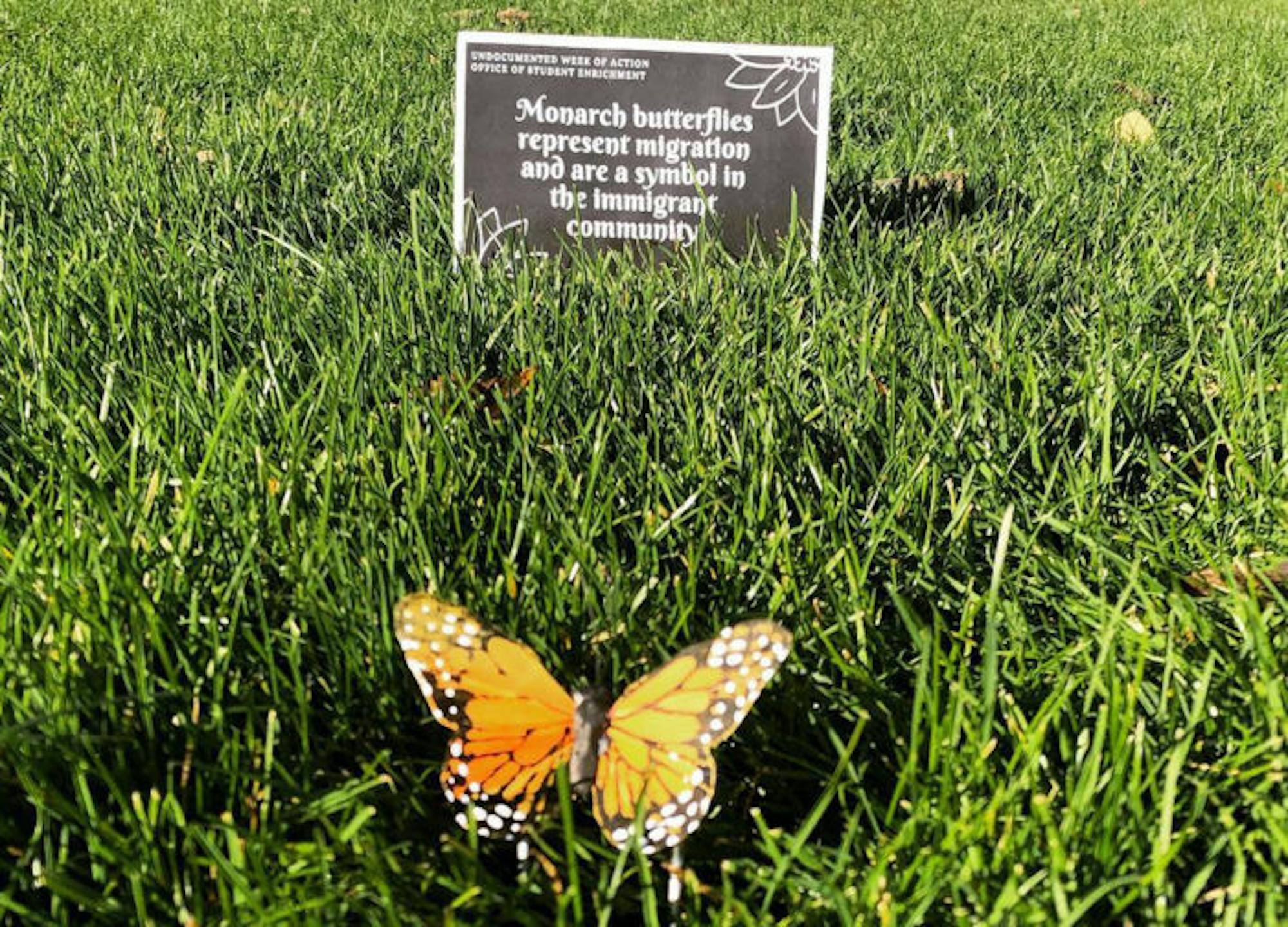Last week, Notre Dame’s Office of Student Enrichment sponsored a week dedicated to providing support and awareness for undocumented and DACA students with a series of events Monday through Friday.
Christin Kloski, the project coordinator for the department, said over the summer she noticed universities in California and Texas were sponsoring weeks centered around immigration issues.
“Over the summer, we thought about developing more programming for awareness on DACA and undocumented issues presented through our office,” Kloski said. “ ... It's designed more for an engagement for faculty, staff and peers, to raise awareness for undocumented individuals in our country, in addition to the topic of immigration at large.”

As part of the events of the Undocumented Student Week of Action, monarch butterflies symbolizing migration were placed on the green in front of Dillon Hall.
As part of the events of the Undocumented Student Week of Action, monarch butterflies symbolizing migration were placed on the green in front of Dillon Hall.
According to the Undocumented Students Program at UCBerkley, DACA was put in place “to protect eligible immigrant youth who came to the United States when they were children from deportation.” DACA gives those children protection from deportation, and a work permit as long as their DACA application is renewed every two years.
On the other hand, undocumented students are students who do not have legal citizenship in the United States but are able to apply to any U.S. university that allows undocumented student applications. Notre Dame is one of those universities that accepts undocumented students.
Many of the events throughout the week focused on providing stress relief and emotional support for DACA and undocumented students. All events were open to students who were not undocumented as well.
One of those events was “Storytelling and Emotional Healing Through Art.”
“It was a space for people to sit down and reflect, and a space for healing through the process of being either supporter or someone who is undergoing the stresses of being an undocumented or DACA student here on campus,” Kloski said. “When you're able to express it through another form, I think it allows for some healing and to process those emotions, reflect on that.”
Kloski said the office created a website to help DACA and undocumented students feel welcome and have information concerning the University and their documentation status in one place.
“If you are a are a high school student or you’re looking to apply to universities, your first step is typing in DACA or undocumented students applications at universities or universities that accept undocumented students,” Kloski said. “Our website would be one of those many that would pop up. And on our website we provide information about main contacts, and we have those resources and those supporters throughout all parts of campus.”
The Office of Student Enrichment also hosted a Welcome Weekend session for undocumented students and their parents for the first time this year.
On Thursday, the office held an event called, “Butterfly Support Letters,” which involved allies of undocumented and DACA students writing letters of support to those students.
The letters will be hung up for DACA and undocumented students to see.
“It was amazing to hear the words of what our campus has to say to them. It’s so positive and I think it changes the light for our students here on campus just to feel that and to see the names that are on there, because those people might be in their classrooms, and they might be a professor,” Kloski said.
On Friday, the week concluded with “Monarch Butterflies on the Green,” a unique event that symbolized migration. The butterflies were placed on the lawn in front of Dillon Hall.
“The monarch butterfly represents migration,” Kloski said. “And it’s a symbol for immigrant community. Monarch butterflies migrate into Mexico when it gets cold and then migrate back into the United States. So it creates a great symbol for that immigration story. ... I just think it was a really great idea to display that, for people to see that. It’s a little bit of a quiet form of support. It’s not necessarily like loud and bold, but it’s simple. And people can walk by and do the prayer or just silently reflect on the lives and undocumented individuals in our community.”
Kloski said many students do not know what it means to be undocumented or to have DACA status.
“I know we’re trying to create a program for next semester to create allies here on campus so that we can again show that support, whether that's through programming or allyship,” Kloski said. “I think just knowing what the phrase ‘DACA’ is or what that policy might be, it's something that a lot of individuals might not know. You might know someone’s story, but you don’t necessarily know the policies behind it.”









